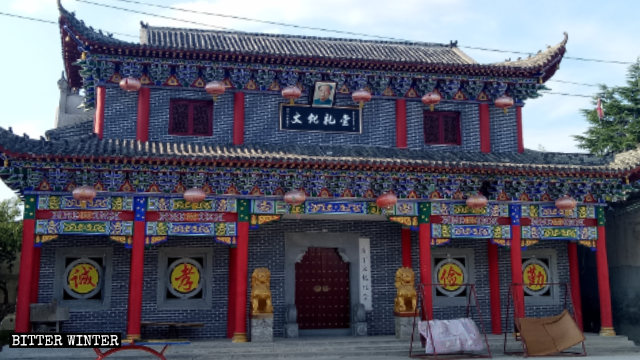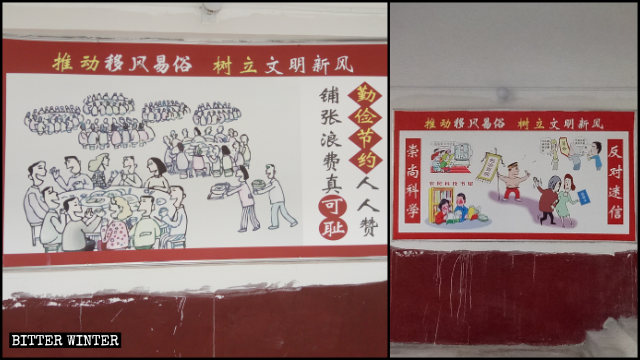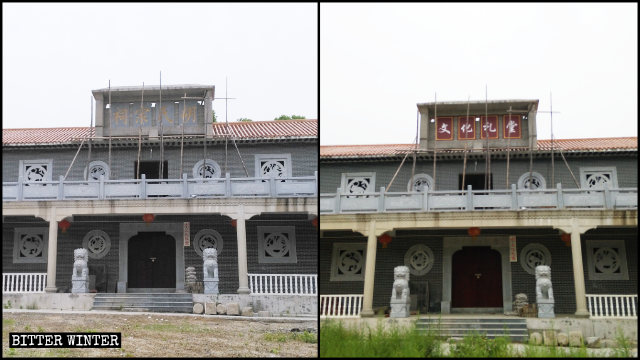Tongcheng county government in Hubei Province launched a coordinated crackdown against folk religions by repurposing family shrines built to honor ancestors.
by Dai Quansheng
As part of the Chinese folk culture, people across the country build and use ancestral homes, passed down through generations, to pay tribute, offer sacrifice in honor of their ancestors. By doing so, families also maintain unity and help to identify themselves with their clan to continue their lineage.
As the CCP intensifies suppression on religious beliefs and activities, it has become more and more challenging to preserve historical and traditional ancestral shrines. Following the conversion of over 200 ancestral halls into propaganda bases in Tongshan county, administered by Xianning, a prefecture-level city in the central province of Hubei, 24 ancestral clan halls in the adjacent Tongcheng county were also converted into cultural auditoriums.
“The culture of ancestral halls has a history spanning over a thousand years. We have been paying homage and offering sacrifice to our ancestors according to the old ways,” a clan elder from Tongcheng county explained. “The government, however, declared that our ancestors do not exist and prohibited us from building ancestral halls.”
The Jin family ancestral hall, built in 1854, during the reign of the Qing dynasty (1644-1911), was identified as the pilot site for the rectification of ancestral clan halls in Tongcheng county. It has been changed beyond recognition. The sign with the family name above the entrance to the building has been changed to “Cultural Auditorium,” and a portrait of Mao Zedong has been placed above it.
In the main hall, a tablet with Chinese characters for “ancient ancestor hall” was replaced with a Chinese word for “filiality,” filial piety being one of the essential tenets in traditional Chinese culture. Various posters promoting the “transformation of social traditions” now cover the walls of the hall.

“Transforming social traditions” means changing people’s old customs. More often than not, Chinese people’s awareness of religion is expressed in their daily folk religious activities, like offering sacrifices. However, the CCP regards such traditions as feudal conventions, and they are subjected to suppression, with the ultimate goal of eradicating folk religions.

“The county government has used the Jin family hall as a model for rectification of other ancestral halls. Officials in charge of similar projects in other locations will be brought here to see how it has been done,” a local insider who required anonymity revealed to Bitter Winter.
He added that local government officials are stringent in ordering the overhaul of ancestral halls: if their commands are not followed, the halls will be shut down. “It’s a state policy to prohibit the development of clans, in case they run amok and cause troubles,” the insider said.
For dictatorships, any form of organized group is viewed as a threat to their regime, and the effective way to clear up the risks is to eliminate all organizations that may unite. It is the case in CCP’s crackdown on Christianity, the purge and suppression of Tibetan Buddhists and Muslims in Xinjiang.
On orders from local authorities, the Hu ancestral hall with nearly 400 years of history had its name replaced with a “Cultural Auditorium” sign on September 15.

In March, the Ding family ancestral hall, built during the Song Dynasty (960 – 1279), was also repurposed for a cultural auditorium, spiritual maxims covered with a signboard promoting the core socialist values. The clan culture which has been passed down through generations for over a thousand years was stifled.
Source: Bitter Winter












